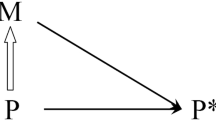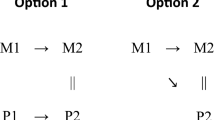Abstract
We examine Sophie Gibb’s emergent property-dualist theory of mental causation as double-prevention. Her account builds on a commitment to a version of causal realism based on a powers metaphysic. We consider three objections to her account. We show, by drawing out the implications of the ontological commitments of Gibb’s theory of mental causation, that the first two objections fail. But, we argue, owing to worries about cases where there is no double-preventive role to be played by mental properties, her account, which solely affords mental properties a double-preventive role, is incomplete and vulnerable to a causal exclusion objection. We propose a friendly modification to her theory of mental causation that is consistent with her theory’s ontological commitments. Specifically, we sketch an account on which mental properties have a more pronounced causal-structuring role that is not exhausted by the role Gibb assigns them as double-preventers. The result is a novel emergentist theory of mental causation.


Similar content being viewed by others
Notes
While both of the authors of this article regard Gibb’s strategy and her general theory of mental causation as attractive, providing a promising framework for developing a solution to the causal exclusion problem for emergent property dualists, it is not the case that both authors accept dualism of any sort. One of the authors (Andrei Buckareff) favors a version of neutral monism that is best described as a version of panprotopsychism on which all properties are proto-phenomenal powers. That said, both authors regard the account sketched here to be the best way to fix Gibb’s account and think it is the best option for those who endorse theories that are committed to mental properties being strongly emergent.
We specify some further ways a property can be causally relevant in Sect. 6, below.
Specifically, Schneider (2012) has argued that property-dualism commits one to either Cartesian substance dualism or a dualism of physical and hybrid substances. The argument is based on the assumption that properties are ways that substances are. Thus, if a substance has both mental and physical properties, one of the ways it is is characterized by the mental properties. Hence, we have a hybrid substance that is not purely physical. Schneider suggests that the property dualist endorse the hybrid view. We expect that Gibb would be sympathetic to this claim given that she endorses the view that properties are borne by and are ways that substances are (see Gibb 2017).
See Buckareff 2022a for a powers realist argument against identifying powers with dispositions and against taking ‘power’ and ‘disposition’ to be interchangeable (powers provide the truthmakers for disposition-ascriptions).
See Taylor 2018 for an argument to the effect that there is no real difference between a pure powers view and at least certain accounts of powers as powerful qualities.
Martin’s discussion, while quite rich, is very short (spanning pages 48–51 of his 2008).
Gibb explicitly endorses a Kimean metaphysics of events. She takes both causes and effects to be Kimean events (Gibb, 2019, p. 119, n. 1).
Incidentally, Gibb (2010) offers a critique of the role afforded conserved quantity views of causation in defenses of physicalism. Specifically, she argues that, while they may capture something that is correct about physical causation, the move to saying that a transference of a conserved physical quantity is characteristic of all causal relations is question-begging (see Ibid., pp. 376–377).
A referee for this journal raised worries about whether the locality condition is a commitment of a powers-theory of causation. They offered the example of gravity, in particular where gravitational force is exerted across a vast distance (e.g., between the Sun and the Earth). The worry is that such a view requires that one take such objects to be connected by something such as interacting fields or spacetime regions. On such a view, for instance, the constitutive powers of the gravitational field of the Sun are manifested when partnered with the constitutive powers of the Earth’s gravitational field. The worry may be that this renders a metaphysical theory of causation hostage to the sciences. Suppose we learn tomorrow that putative cases of action at a distance do, in fact, violate the locality condition. In that case, then we may either need to abandon causal realism entirely or treat the locality condition as typically satisfied but as a non-essential feature of processes of causal production. The second option may lead one to endorse a version of causal pluralism (see, e.g., Cartwright, 2007) on which the locality condition is satisfied with certain processes and not with others. In any case, for our purposes here, the sorts of causal processes we are interested in are ones that would satisfy the locality condition (see Gibb, 2013, p. 200). Such causal processes involve the polygenic production of an outcome by a constellation of powers whose manifestations depend upon their interacting in a way that would satisfy the locality condition (even if it is best to endorse a capacious notion of “local,” see Williams, 2019, pp. 144–146).
For one, we do not accept the distinction between the agent/person and their body that Lowe endorses. Rather, as noted, we assume that an agent is a functionally integrated hybrid system composed of simple objects and their properties, including emergent psychological properties.
Alexander Carruth and Sophie Gibb argue that Lowe’s “distinction between fact and event causation is difficult to maintain within most common ontological systems” (2018, p. 150).
None of this is meant to imply that these three philosophers endorse the same metaphysics of mind. They are quite different. Lowe defended a non-Cartesian substance dualism. Dretske endorsed physicalism. Finally, Jaworski endorses a stronger version of hylomorphism than we are presenting here on which psychpowers exert downward causal influence. Limitations of space do not allow us to examine any differences and similarities between what we are proposing and the various proposals offered by Dretske, Jaworski, and Lowe.
A referee for this journal suggested that there are similarities between our account and the program explanation account of Jackson and Pettit.
See Aristotle, Physics 194b23-35 (1996). We are not suggesting that the way of carving up the four causes we present actually tracks how Aristotle treated his four causes.
Note that we assume that bodily activity is not limited to overt actions. Mental actions involve bodily activity in the form of neurophysiological activity.
The authors wish to thank two anonymous referees for this journal for their very helpful feedback on an earlier version of this article. Some of Andrei Buckareff’s work on this article was generously supported by a grant from the John Templeton Foundation (Grant #62683, “Panpsychism and Pan(en)theism: Philosophy of Mind Meets Philosophy of Religion). None of the views presented in this article necessarily represent those of the John Templeton Foundation.
References
Aguilar, J., & Buckareff, A. (2022). Agency and causation. In L. Ferrero (Ed.), Routledge handbook of philosophy of agency (pp. 27–36). Routledge.
Aristotle. (1996). Physics. In R. Waterfield (Ed.), Oxford World’s classics: Aristotle: Physics. Oxford University Press.
Buckareff, A. (2018). I’m just sitting around doing nothing: On exercising intentional agency in omitting to act. Synthese, 195, 4617–4635.
Buckareff, A. (2022a). Disentangling dispositions from powers. Dialogue: Canadian Philosophical Review, 61, 107–121.
Buckareff, A. (2022b). Two-way powers as derivative powers. In M. Brent & L. Titus (Eds.), Mental action and the conscious mind (pp. 228–254). Routledge.
Carruth, A., & Gibb, S. (2018). The ontology of E. J. Lowe’s substance dualism. In A. Carruth, S. Gibb, & J. Heil (Eds.), Ontology, modality, and mind: Themes from the metaphysics of E. J. Lowe. Oxford University Press.
Cartwright, N. (2007). Hunting causes and using them: Approaches in philosophy and economics. Cambridge University Press.
Davies, K. (2016). Powers, double prevention, and mental causation. Metaphysica, 17, 37–42.
Dretske, F. (1988). Explaining behavior: Reasons in a world of causes. The MIT Press.
Dretske, F. (1997). Naturalizing the mind. The MIT Press.
Gibb, S. (2010). Closure principles and the laws of conservation of energy and momentum. Dialectica, 64, 363–384.
Gibb, S. (2013). Mental causation and double prevention. In S. Gibb, E. J. Lowe, & R. Ingthorsson (Eds.), Mental causation and ontology (pp. 193–214). Oxford University Press.
Gibb, S. (2015a). Defending dualism. Proceedings of the Aristotelian Society, 115, 131–146.
Gibb, S. (2015b). The causal closure principle. Philosophical Quarterly, 65, 626–647.
Gibb, S. (2015c). Physical determinability. Humana Mente: Journal of Philosophical Studies, 29, 69–90.
Gibb, S. (2017). The mental causation debate and qua problems. In M. P. Paoletti & F. Orilia (Eds.), Philosophical and scientific perspectives on downward causation. Routledge.
Gibb, S. (2019). Causal closure. In S. Gibb, R. Hendry, & T. Lancaster (Eds.), The Routledge handbook of emergence (pp. 111–120). Routledge.
Hall, N. (2004). Two concepts of causation. In J. Collins, N. Hall, & L. A. Paul (Eds.), Causation and counterfactuals (pp. 225–276). The MIT Press.
Heil, J. (2003). From an ontological point of view. Oxford University Press.
Jackson, F., & Pettit, P. (1988). Functionalism and broad content. Mind, 97, 381–400.
Jackson, F., & Pettit, P. (1990a). Causation in the philosophy of mind. Philosophy and Phenoenological Research, 50, 195–214.
Jackson, F., & Pettit, P. (1990b). Program explanation: A general perspective. Analysis, 50, 107–117.
Jaworski, W. (2016). Structure and the metaphysics of mind: How hylomorphism solves the mind-body problem. Oxford University Press.
Kim, J. (1976). Events as property exemplifications. In M. Brand & D. Walton (Eds.), Action theory (pp. 159–177). D. Reidel.
Kim, J. (1989). Mechanism, purpose and explanatory exclusion. Philosophical Perspectives, 3, 77–108.
Kim, J. (2005). Physicalism, or something near enough. Princeton University Press.
Kim, J. (2010). Causation and mental causation. In J. Kim (Ed.), Essays in metaphysics of mind (pp. 243–262). Oxford University Press.
Lombard, L. (1979). Events. Canadian Journal of Philosophy, 9, 425–460.
Lombard, L. (1998). Ontologies of events. In S. Laurence & C. Macdonald (Eds.), Contemporary readings in the foundations of metaphysics (pp. 277–294). Blackwell.
Lowe, E. J. (2000). Causal closure principles and emergentism. Philosophy, 75, 571–585.
Lowe, E. J. (2006). Non-Cartesian substance dualism and the problem of mental causation. Erkenntnis, 65, 5–23.
Lowe, E. J. (2008). Personal agency: The metaphysics of mind and action. Oxford University Press.
Malcolm, N. (1968). Conceivability and mechanism. The Philosophical Review, 77, 45–72.
Martin, C. B. (2008). The mind in nature. Oxford University Press.
Molnar, G. (2003). Powers: a study in metaphysics. Oxford University Press.
Mumford, S. (2009). Passing powers around. The Monist, 92, 94–111.
Mumford, S., & Anjum, R. (2009). Double prevention and powers. Journal of Critical Realism, 8, 277–293.
Mumford, S., & Anjum, R. (2011). Getting causes from powers. Oxford University Press.
Prior, E., Pargetter, R., & Jackson, F. (1982). Three theses about dispositions. American Philosophical Quarterly, 19, 251–257.
Schneider, S. (2012). Why property dualists must reject substance physicalism. Philosophical Studies, 157, 61–76.
Taylor, H. (2018). Powerful qualities and pure powers. Philosophical Studies, 175, 1423–1440.
Williams, N. (2019). The powers metaphysic. Oxford University Press.
Author information
Authors and Affiliations
Corresponding author
Ethics declarations
Conflict of interest
The authors have no known conflicts of interest in submitting this article for review.
Additional information
Publisher's Note
Springer Nature remains neutral with regard to jurisdictional claims in published maps and institutional affiliations.
Rights and permissions
Springer Nature or its licensor (e.g. a society or other partner) holds exclusive rights to this article under a publishing agreement with the author(s) or other rightsholder(s); author self-archiving of the accepted manuscript version of this article is solely governed by the terms of such publishing agreement and applicable law.
About this article
Cite this article
Buckareff, A.A., Hawkins, J. Emergent mental properties are not just double-preventers. Synthese 202, 53 (2023). https://doi.org/10.1007/s11229-023-04282-4
Received:
Accepted:
Published:
DOI: https://doi.org/10.1007/s11229-023-04282-4




